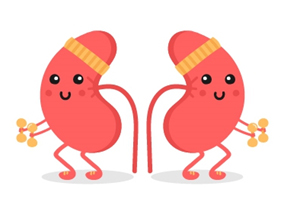Kidney Function
Kidney Overview
The kidneys are located on both sides of our lower back, adjacent to the spine, roughly at the angle where the last rib (the twelfth rib) meets the spine. They have a shape similar to the beans we eat and are approximately the size of a fist. Each kidney weighs around 125-150 grams.
The basic structural units of the kidneys are called "nephrons." Each kidney is composed of about a million nephrons, each of which includes a renal corpuscle (glomerulus) and a renal tubule.
physiological function of kidney

The kidneys play a crucial role in maintaining the body's overall health by performing several vital functions:
-
Filtration: The kidneys filter waste products, excess fluids, and toxins from the blood to create urine.
-
Fluid and Electrolyte Balance: They regulate the balance of water and electrolytes (sodium, potassium, etc.) in the body, helping maintain proper hydration and blood pressure.
-
Acid-Base Balance: The kidneys help regulate the body's pH level by controlling the balance of acids and bases.
-
Blood Pressure Regulation: They release hormones like renin to control blood pressure and ensure adequate blood flow to different organs.
-
Red Blood Cell Production: The kidneys produce a hormone called erythropoietin, which stimulates the bone marrow to produce red blood cells.
-
Vitamin D Activation: The kidneys activate vitamin D, which is important for calcium absorption and bone health.
-
Waste Excretion: The kidneys eliminate waste products, toxins, and excess substances from the body via urine.
-
Hormone Regulation: They help regulate hormones like aldosterone and antidiuretic hormone (ADH), which impact fluid balance and blood pressure.
The proper functioning of the kidneys is essential for maintaining overall health and preventing various health issues.


